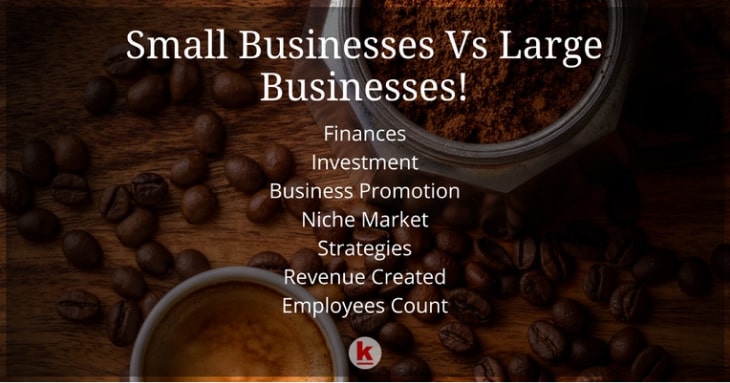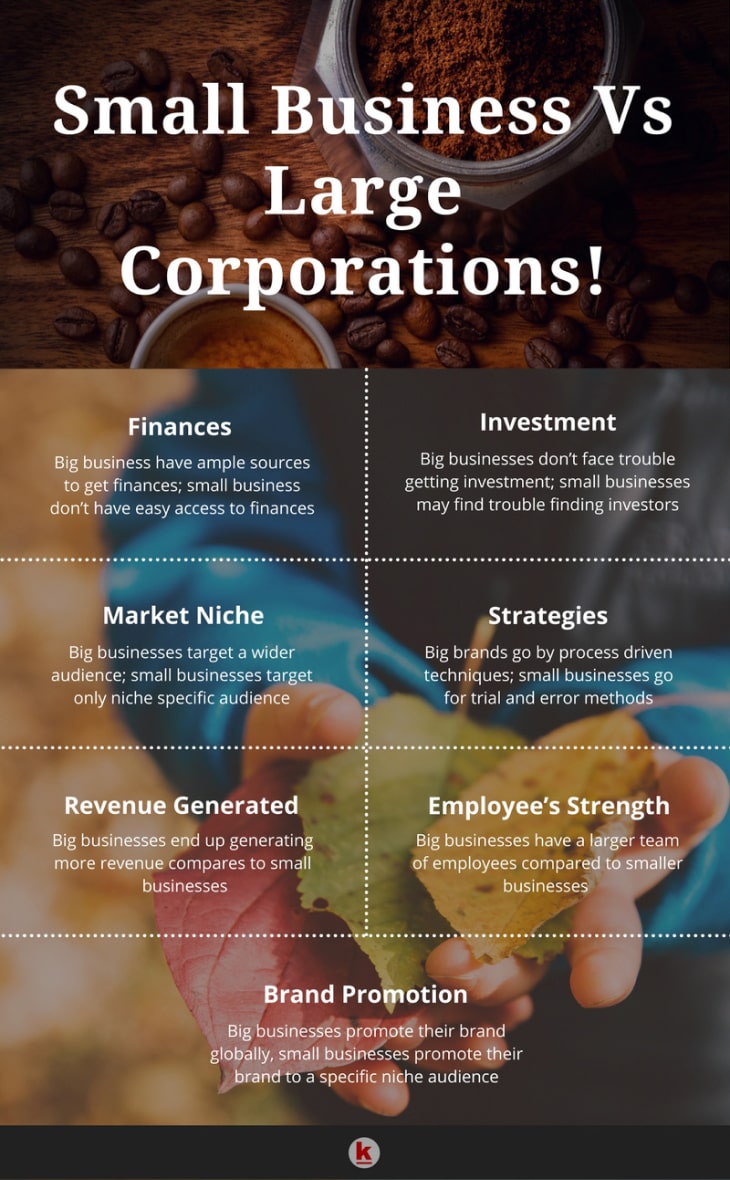
Small Business Vs Big Business!

Running a business successfully involves a well-planned strategy and a list of goals which can be achieved through various techniques. It also involves analyzing and assigning tasks to appropriate employees. But what differentiates a big business from a small business? And how can a small business become well-established in its market?
There are a couple of key points that separate a big business from a small one. Strategies and goals may not be starkly different, but if a small business wishes to reach greater heights, they must know how to strategize and build their business up to a point where it is no longer a small business. Having said that, what are the various things that differentiate these two types of businesses?
Here’s what makes them different:
Finances
Financing is the heart and soul of a business, it is the key point to build a successful business. Without adequate funds or finances, it is difficult to set up and establish any business.
Big businesses that operate on a global level are already established and do not have a problem raising funds since they have access to investors, loyal customers and have their presence worldwide. However, in the case of small businesses, they are completely dependent on their personal investment or loans from banks. This is because a small business is still in the process of becoming a big brand. This is by far the basic characteristic of businesses that separates a big business with.
Investment
Big brands that are well established in the industry or market do not have trouble raising funds through investors. This is because they have risen to a level where investors can trust the business and their capabilities to grow further. A business that has done well can be trusted on showing success in the future. On the other hand, a small business still in the process of establishing itself in the market may find trouble finding investment from investors. This is because they do not have the kind of assurance a big business does to assure investors that their venture or business will be successful in the future.
Brand promotion
Big brand and businesses are big because they are known and recognized on a global level. For example, Nike is a well-established brand that promotes itself through marketing and advertisements across the globe. Big businesses also have the funds and ability to hire celebrities and influencers to market their products. It goes without saying that big businesses cater to a much larger audience than a small business. On the other hand, a small business is more likely to have limited marketing and advertisements, specific to their niche audience, which may not be very large in numbers. Therefore, another big differentiator between big and small businesses is the scale of brand promotion.
Market niche
Big businesses have a wider scope of the audience than smaller businesses, precisely due to the nature of their products or services. For example, Apple manufactures electronic devices for a large target audience, be it male, female, adult or child. As a company, Apple wants to target more and more people, without having a specific niche market.
Small businesses, on the other hand, cater to a niche specific audience. This is mainly due to the amount of finance, investment, advertisement involved and also the nature of their products or services. For example, Basecamp is a project management system for businesses to handle projects on a daily basis; and this software has a very specific niche audience.
Both kinds of businesses aim for expansion, but the bottom line is that Apple will always be a bigger business than Basecamp.
Strategies
Big brands usually follow process-driven strategies and such a strategy which usually involves lesser risk. However, small brands that are already in the mode to establish a strong market and strong reputation often use trial and error methods to identify how to establish themselves in the market. The big brands or well-established businesses that have a firm foothold do not experiment yet this not mean that do not prefer innovation.
Big brands have a good understanding of the market, they have everything in their favor, a huge follower base, ample marketing tools and a fairly good idea about the kind of content their audience likes. These are things that come with being big players in the market.
Small businesses, on the other hand, are at greater risk since they still experiment with different strategies to identify what works for them and what doesn’t.
Revenue generated
It goes without saying that big businesses have a bigger turnover than small businesses. You could say it’s a big loop of success. The more money a business makes, the more opportunities they have to further grow and invest in their business. Smaller businesses do not generate as much revenue as bigger businesses, simply because they are not big players yet. This is another factor that separates a big business from a small one.
Employee’s strength
As mentioned above, big businesses operate on a global scale, which means they cater to more people, in more countries and more often than smaller businesses. Having said that, the employee strength of big businesses is bound to be larger than that of a small business. This is simply because bigger businesses have more to do, manage and handle; whereas smaller businesses may not have as much to do or as many customers to handle. Naturally, the bigger your business grows, the larger your team gets.
To conclude, the basic functioning of a business stays the same. Be it marketing, processes, promotion, fundraising. What differentiates a big business from a small one is the scale of work that is being done.
Want to publish your content on the RedAlkemi blog? We accept and publish guest posts too! Check out our guest post terms.
